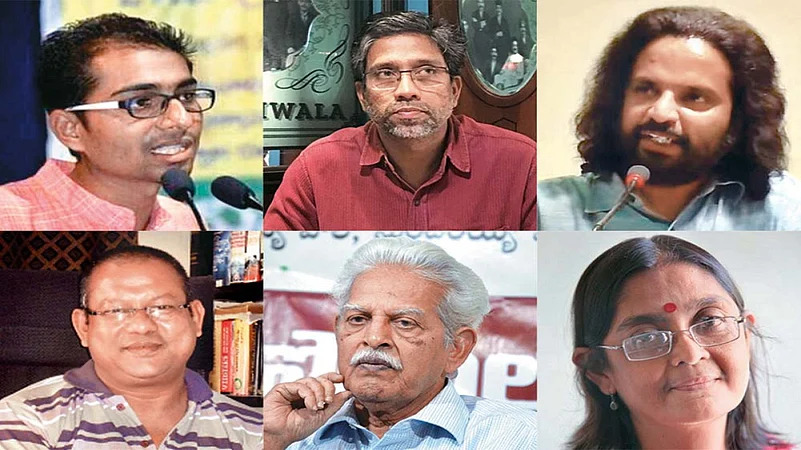Arsenal Consulting, a Massachusetts-based digital forensic company, has found that malware was used to insert incriminating letters into the computer of prisoners’ rights activist Rona Wilson, one of the 16 people incarcerated in connection with the Bhima-Koregaon ‘Maoist conspiracy’ case. According to Arsenal, this “is one of the most serious cases involving evidence tampering that Arsenal has ever encountered, based on various metrics, which include the vast timespan between the delivery of the first and last incriminating documents”. With the authenticity of key evidence now under a cloud, those who have been claiming that none of the accused had any role in violence related to the Elgaar Parishad’s event at Bhima-Koregaon, a village near Pune, on January 1, 2018, are feeling vindicated. The letters—allegedly mentioning a plot to kill PM Narendra Modi—are key evidence on whose basis the ‘BK16’ (as they have come to be known in the campaigns for their release) are facing trial under the Unlawful Activities (Prevention) Act (UAPA) for alleged links with the outlawed CPI(Maoist).
For Mumbai-based filmmaker Koel Sen, the Arsenal report is a shot in the arm in their fight for justice. Koel says her mother Shoma Sen, a women’s rights activist and former English professor at Nagpur University, should be immediately released on bail along with the other accused as the report corroborates their claims. “I don’t understand why they are being kept in prison anymore. According to the UAPA, if the prima facie evidence proved to be wrong and planted, that itself requires an investigation,” adds Koel.
One of the other accused is Delhi University professor Hany Babu, who was arrested by the NIA in July 2020. His wife Jenny Rowena, also a DU professor, says it is the court’s responsibility to ensure a fair trial by checking the veracity of evidence presented by the Pune police and the NIA. Their house was raided twice—laptops were confiscated and books were taken away. Rowena says the Maharashtra police questioned Hany Babu over 62 documents inside a folder on his computer. Some of the letters were allegedly between Maoists. “He had never seen the documents. Why would he keep incriminating documents in the computer?” asks Rowena, who believes Hany Babu is being “punished for being instrumental in implementing reservation in university admissions”. “They don’t want socially conscious teachers around. I think it’s a message to all teachers,” adds Rowena.
Besides Rona, Shoma and Hany Babu, lawyers Surendra Gadling, Sudha Bharadwaj and Arun Ferreira, Dalit rights activist Sudhir Dhawale, forest rights activist Mahesh Raut, octogenarian Jesuit priest Stan Swamy, poet Varavara Rao, democratic rights activists Gautam Navlakha and Vernon Gonslaves, Dalit scholar and management professor Anand Teltumbde, and Kabir Kala Manch artistes Sagar Gorkhe, Ramesh Gaichor and Jyoti Jagtap were also arrested on the basis of the incriminating letters. The NIA continues to insist that the Pune-based Regional Forensic Science Lab didn’t find malware on the seized computers.
The Pune police, which initially probed the case, claimed that letters mentioning the alleged assassination plot were found in Rona’s computer. The Arsenal report says the computer had been “compromised for over 22 months” before it was seized by the National Investigative Agency (NIA) on April 17, 2018. “The attacker responsible…had extensive resources, including time, and it is obvious that their primary goals were surveillance and incriminating document delivery,” states the report. Through remote access, the “attacker” created a hidden folder containing at least 10 incriminating letters. “The letters were created using a newer version of Microsoft Word that did not exist on Rona’s computer,” the report says, adding that the hidden folders or the documents were never opened. Rona’s lawyers have moved the Bombay High Court demanding a probe by a special investigation team (SIT) into the alleged planting of incriminating documents. “The entire case is based on electronic evidence, and there is now sufficient doubt about the credibility of the letters. This strengthens our case,” says Mihir Desai, who represents Rona and other accused in the case.
“We have always said there is nothing authentic or plausible about the letters they used to keep 16 people in jail even as Hindu outfit leaders Milind Ekbote and Sambhaji Bhide, who incited the violence, were allowed to roam free. Why are we having to shout from the rooftops that the entire thing is fabricated?” asks Susan Abraham, whose husband Vernon Gonsalves, a Mumbai-based democratic rights activist, was arrested in August 2018. “It’s a complete travesty of criminal jurisprudence. The Pune police and the NIA have failed to follow due process right from seizing the electronic devices to the arrests, and ever since. None of the accused were provided with the hash value of the electronic device at the time of seizure and some are yet to get a clone copy of the devices.”
Desai says the Arsenal findings will have larger implications on the question of privacy and admissibility of electronic evidence in a court of law. “This is significant in terms of the general atmosphere of surveillance in the country. If people can go to this extent to implicate others, then one has to be very cautious. The rot has set in so deep that anybody can plant anything in your computer now,” the lawyer adds.
The report points out that Rona’s computer was “compromised” on June 13, 2016, after a series of suspicious emails exchanged with someone using Telugu poet Varavara Rao’s email account. Rao’s nephew, cultural activist N. Venugopal, says the report vindicates their argument that the case against Rao is a “fabricated” one and won’t stand judicial scrutiny. “The courts have been dodging our demand to get clone copies of the devices for further examination. Rao is not tech-savvy. He opened an email account after his family persuaded him. The attacker must have sent malware to his account, and he may have unknowingly opened the file, letting the malware enter the system,” says Venugopal.
The 82- year-old poet’s deteriorating health in jail has been a constant worry for his family since his arrest in August 2018. Venugopal also points out previous instances that cast a shadow on the veracity of the electronic evidence presented by the NIA. In 2019, WhatsApp confirmed that Israeli spyware Pegasus was used to snoop on rights activists, lawyers and academicians through their mobile phones.
“There is hope and apprehension in equal measure. We will feel vindicated only if we get justice,” says Anand, brother-in-law of Mahesh Raut, the forest rights activist and former PM rural development fellow who is the youngest among the accused.. “The Uddav Thackeray-led Maharashtra government gave us hope by demanding an SIT probe, but it went on the back foot after the Centre shifted the case to the NIA.”
Imprisoned human rights lawyer Surendra Gadling’s wife Minal says that although “justice delayed is justice denied, the Arsenal report has revived our hopes”. The Pune police had claimed that it recovered references to the alleged conspiracy to kill the prime minister from Gadling’s laptop too. “Truth is his computer only had project work of our children,” says Minal.


























